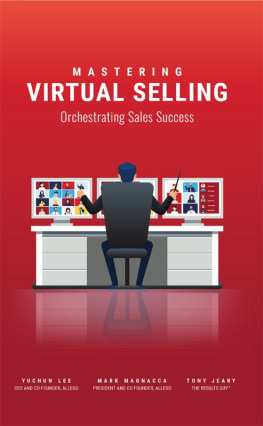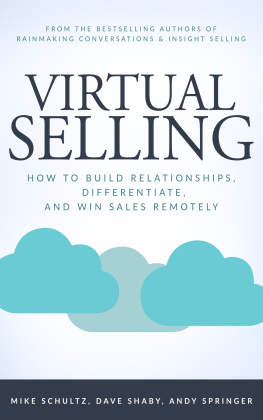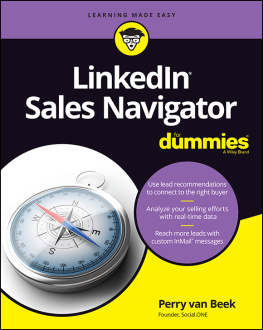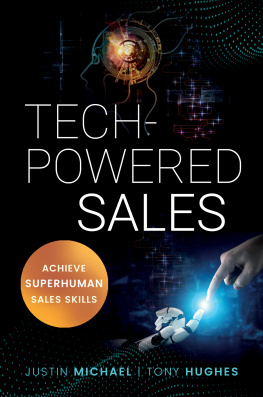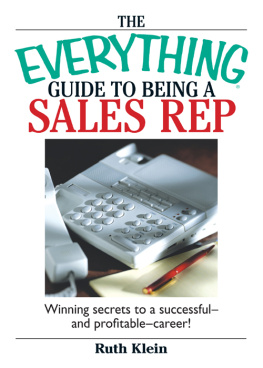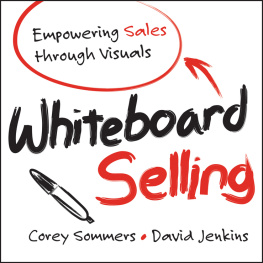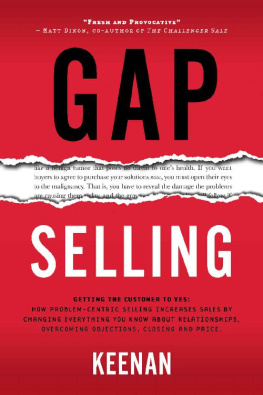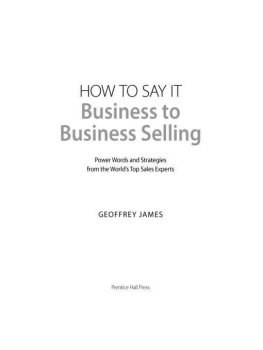Mastering Virtual Selling
2021 by Tony Jeary, Yuchun Lee, and Mark Magnacca
All rights reserved. No part of this book may be reproduced or transmitted in any form or by any means, electronic or mechanical, including photocopying, recording or by any information storage and retrieval system, without permission in writing from the copyright owner.
Published by Results Faster Publishing and Allego in association with Clovercroft Publishing, Franklin,Tennessee
Edited by Nonie Jobe
Cover Design by Delin Design
Interior Design by Adept Content Solutions
Printed in the United States of America
978-1-954437-11-1
LIST OF FIGURES
MASTERING
VIRTUAL SELLING
Orchestrating Sales Success
A popular expression is Predictions are risky, especially about the future. We have now heard countless new normal forecasts that simply project behavior during pandemic conditions into the future. What differentiates Mastering Virtual Selling is its perspective, realistic assumptions, and insights that benefit salespersons, managers, and executives leading an entire organization.
In any market at any time, the most important thing about selling is buying, and that perspective informs this books discussion and recommendations. The authors emphasize that good selling is grounded in the ability to craft a relevant and value-added buying experience, and thats true whether you are selling virtually or in person. Their goal is not only to help sellers make better use of new tools but also to help them rethink how they sell in response to omnichannel buying behaviora trend in place before the pandemic but accelerated by it.
Moreover, the authors do not assume that were entering a digital-eats-physical world. Buying has always been a social as well as economic transaction. Hence, its not an either-or choice (virtual versus in person) when it comes to selling. Digital tools were available for years before the pandemic forced firms to use them in go-to-market initiatives. Once used, many companies found that, in effect, they had been overpaying for certain tasks in their sales models, ranging from lead generation and demos to meetings where virtual means can be used productively. As the authors emphasize, while virtual experiences will not replace our need for true human interaction, virtual selling is here to stay.
Especially in B2B markets, the real need is the integration of virtual selling into hybrid models of interaction with customers. This book explains how to do that by leveraging other resources across the organization in a team-selling model to improve results. Think about the impact to your company of increasing available selling time by 1020 percent. For most companies, thats not only a major productivity benefit; it also increases the total addressable market because segments that were too costly to reach now become economically feasible.
Finally, Mastering Virtual Selling is also a book for managers, not pundits with an abstract understanding of technology but no experience with actual sales management. In business, selling effectiveness is an organizational outcome, not only the result of skilled salespeople in your firm. The theme throughout this book is orchestrating sales success by mobilizing organizational assets and behaviors. Yuchun Lee, Mark Magnacca, and Tony Jeary collectively bring decades of experience to the topic, and their pragmatism and street smarts inform their practical advice. Their distinction between frontstage and backstage activities is important for managers in all sales models, and they provide useful ways of building the required capabilities while debunking many myths about virtual selling.
In a world where competitors will also be using virtual tools and where buyers are already bombarded with messages through multiple media, the authors note that time is the scarce resource. That scarcity has at least two dimensions that are crucial in sales: the time required to manage the buying cycle and the amount of actual face time (either in person or virtual) with target customers. Their insights about aligning synchronous and asynchronous communications are essential. You can use those insights to improve selling skills, increase required cross-functional collaboration in your company, and allocate training, onboarding, coaching, and other resources more effectively. The future is never what it used to be but it arrives daily, and its not the responsibility of the market to adapt to your preferred sales approach. Its your responsibility to adapt to the market. Mastering Virtual Selling can help you do that, navigate the thicket of claims made about online technologies, and better use those tools in customer acquisition and retention.
Frank V. Cespedes teaches at Harvard
Business School and is the author of Sales Management That Works: How to Sell in a World That Never Stops Changing
I n an instant everything flipped! In March 2020 the world turned upside down. People just about everywhere needed to learn a new way to work. And we are betting you were one of them.
Almost 90 percent of selling has moved to a remote model since the COVID-19 pandemic began, according to research from McKinsey, and most B2B companies products and services are now being sold virtually.
What exactly is ? Its not just a series of Zoom meetings! Zoom is just one new way of communicating with your customers virtually.

Virtual selling is about working a deal remotely when you cant be there in person, and it is the new normal. Learning how to do this effectively is critical to your success.
Virtual selling is not a series of Zoom meetings.
Being a great virtual seller means understanding a prospects mindset when you are not meeting with him/her in person and using all the tools and techniques available to be the most successful. While the universal principles of selling are the same, you have new obstacles to overcome and new skills to master.
Thats the challenge. But the opportunity is that there are many advantages in this new normal if you know how to leverage them.
There are three types of people in this worldthose who make things happen, those who watch them happen, and those who wonder what happened. Which kind will you be?
Thats an important question because the mindset you bring to this process will, to a large extent, determine how well you succeed going forward.
WHY READ THIS BOOK?
Mastering virtual selling involves learning a set of insights, disciplines, processes, and technology solutions that equip you to successfully nurture prospects, share information, conduct demos, and host meetings without the benefit of being face-to-face. This book will help improve results for executives, sales leaders, and individual sellers.
We (your coauthors) have worked with tens of thousands of sales professionals around the world and developed unique expertise in virtual selling that can give you an edge. While this book is written primarily for those in B2B (business-to-business) selling, there will be things you can utilize if you are in B2C (business-to-consumer) selling as well.
Everyone in the selling profession is now on a level playing fieldwe are all, in essence, apprentices! The goal of an apprentice, of course, is to eventually become a . And just as an apprentice trains for mastery by working alongside someone more experienced, we invite you to come alongside the three of us as we share our combined knowledge and experiences to help you become a master virtual seller.

